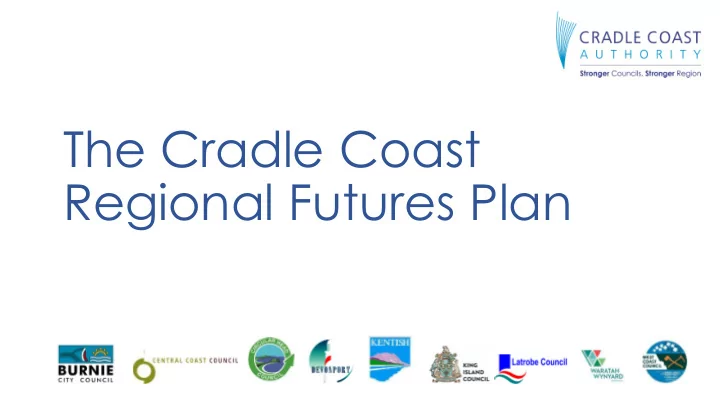

The Cradle Coast Regional Futures Plan
Development • Funded by CCA and Building Better Regions Fund. • Reference Group established around 2016 with UTAS, Burnie City Council, State and Federal Government representatives and others. • Regional Australia Institute rolled out its “Regional Pathfinder” process. • More than 100 stakeholders contributed through workshops and one-on- one consultation. • Published in November 2018.
What it looks like • All about boosting regional growth and fostering a more resilient economy to lift the living standards of all residents in the region. • Or, “more jobs, better jobs”. • Two key features 1. Regional Investment Framework 2. New approach to regional governance - “joined up economic development”
CRADLE COAST AUTHORITY – REGIONAL FUTURES PLAN Boosting regional growth and fostering a more resilient economy to lift the living standards of all residents in the region BENEFITS MAP BENEFIT KPI RESPONSE MEASURE TARGET by 2021 BASELINE data available in 2022 Continue Increase Engagement 148% increase aiming of 15-24yr olds (2016) for national benchmark KPI 1: Increased A skilled and relevant engagement of locals in workforce equipped education or work to support the Continue Increase Engagement 37.1% increase aiming regional economy of 55-65yr olds (2016) for state 40% benchmark Increase to % of adult Tasmanians 49.8% KPI 2: Increased national with literacy skills at (2011) qualifications of or above OECD Level 3 benchmark workforce Continue No. of local workers 23.7% increase aiming with university (2016) for state qualifications benchmark No. of local workers 32.1% Continue with technical (2016) increase of 2% qualifications Difficulty recruiting No skills shortage health prof., KPI 3: Reduction in skills reported in No shortages State-wide construction or shortage reported shortage in health sectors construction (2018) Improved liveability & attractiveness of the KPI 4: Increased Continue recent Increased resident 111,003 region as a place to retention of working trend, increase population (2016) age population by 3% work and live 20% Increase in percent KPI 5: Increased Reverse decline of working age 61.5% attraction of working and increase by people 15-64 yrs of (2017) 1.6% age population age Continue KPI 6: Increased social 97 More people increase of 10% (2017/18) participation employed in the Arts pa. Investor: Cradle Coast Authority Version no.: 0.7 Facilitator: Reviewed by Eldar Salkovic Last modified Carol Bracken (06/01/2020) Accredited: Yes by: 6.0 Template version:
CRADLE COAST AUTHORITY – REGIONAL FUTURES PLAN Boosting regional growth and fostering a more resilient economy to lift the living standards of all residents in the region BENEFITS MAP BENEFIT KPI RESPONSE MEASURE BASELINE TARGET Increase aiming KPI 7: Increased local Increase labour force 53.6% for State employment participation rate (2018) benchmark Improved growth and resilience of the regional economy Reverse Reduced % of 40% 26.2% increase aiming KPI 8: Increase in households in low (2016) for State household income income benchmark KPI 9: Increase in total 7843 Increase no. of Increase by 1% (2018) no. of businesses businesses pa. Continue current trend, Increase in mining 2170 increase by 5% jobs (2017/18) pa. Reverse decline 5193 No reduction in and hold (2017/18) manufacturing jobs numbers Reverse decline 4126 Increase in KPI 10: Increased jobs and increase by (2017/18) Agricultural jobs 0.3% pa. in key sectors underpinning our performance Reverse decline 178 No reduction in jobs and hold (2017/18) in Energy numbers No reduction in Reverse decline $44.2M value of the energy and hold (2017/18) industry numbers Increase by 5% Increase in Tourism pa. aiming to 3049 jobs match state (2016) sector growth Investor: Cradle Coast Authority Version no.: 0.7 Facilitator: Reviewed by Eldar Salkovic Last modified Carol Bracken (06/01/2020) Accredited: Yes by: 6.0 Template version:
Regional Events Working Group RESEARCH Renewable energy Working Group Regional Choose Economic Cradle Coast Development Working Group Steering Group Education and training Working Group CORE TEAM Arts and Culture Working Group
REDSG • Sheree Vertigan AM - principal, education consultant • Professor Jim Cavaye - UTAS • Jim Ertler - Premium Fresh • Lara Hendriks - Dept. of State Growth • Tim Hess - Petuna, freight and logistics • Ian Jones - Business North West, international trade • Cr Vonette Mead – MeadCon • Craig Perkins - RDA Tasmania • Stacey Sheehan - real estate, strong links to DCCI • Catherine Stark - former ecodev officer, Seven Sheds Brewery
Thank you Questions?
Recommend
More recommend